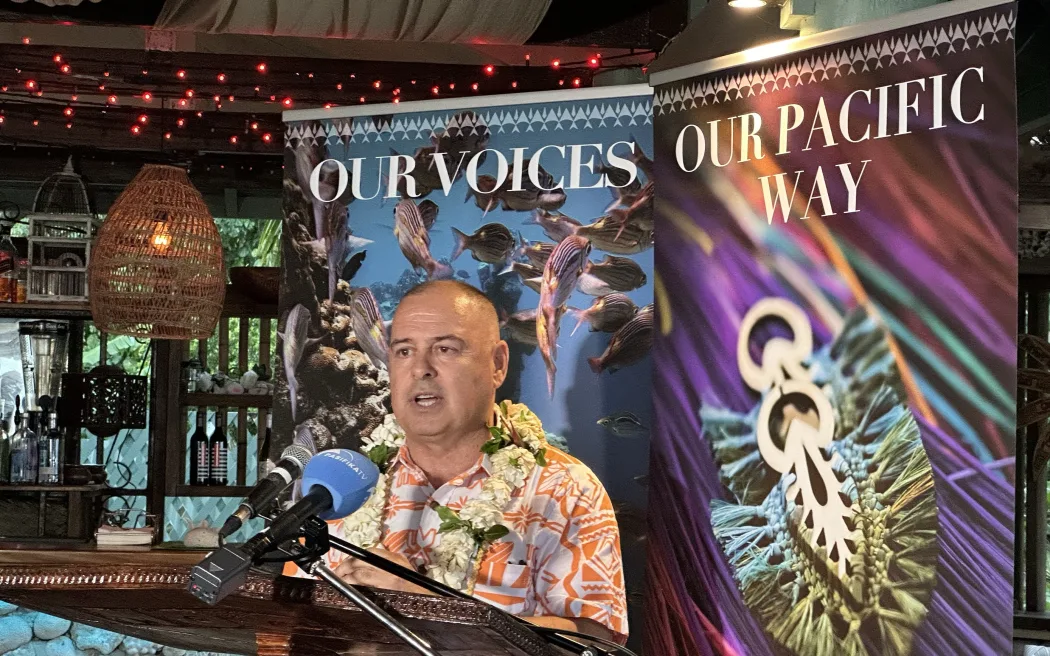Cook Islands Prime Minister Mark Brown is not surprised at the swell of opposition against the Treaty Principles Bill in Aotearoa.
“These are certainly issues that will heat up the passions of people, so I’m not surprised at all that it has led to this nationwide hīkoi,” Brown told RNZ Pacific at a seabed mining meeting in Auckland.
He went on to say indigenous sovereignty was a topic that would stir up passion.
Brown said that as an indigenous landowner in Cook Islands, he personally understood the fight of tangata whenua.
“It’s a very sensitive topic when you’re talking about the tangata whenua and their views of the treaty, in particular the aspects of sovereignty in the treaty and how it’s being recognised in different ways by different people,” Brown said.
“I think they (New Zealand Māori) wanted to make sure that their position is understood and very clear in how they interpreted the treaty, and it doesn’t get changed or reinterpreted in a different way,” he said.
Brown said Cook Islanders and New Zealand Māori shared close genealogical connections and this relationship meant Cook Islanders were naturally interested in the situation.
“Many of the people that live in the Cook Islands now have tangata whenua heritage, so they are very keen to also show their support to the brethren here in Aotearoa,” Brown told RNZ Pacific.
“A march was organised through Rarotonga in support of the hīkoi protesters here (in New Zealand) and we’ve given our blessing for that march to peacefully be taken throughout Rarotonga,”
The late Māori King’s successor and youngest daughter, Kuini Ngā Wai Hono i te Pō, joined the Hīkoi mō te Tiriti as it arrived in Wellington.
Brown said the presence of Kuini further emphasised the significance of the rally.
“To have the Māori Queen there, it just shows how important this is to all Māori people,” Brown said.
As thousands gathered outside Parliament in Wellington, hundreds marched in solidarity in Rarotonga, Cook Islands.
Traditional Cook Islands leaders also declared their support for protest against the Treaty Principles Bill by tangata whenua.
President of the House of Ariki (body of traditional leaders), Travel Tou Ariki said he does not support any changes to or around Te Tiriti o Waitangi.
“I hope these proposals from [the] government don’t go ahead because the treaty has already been made with the Māori people of Aotearoa, but now they (New Zealand Government) are trying to change things and it will diminish the ‘mana’ – the rights and sovereignty of the indigenous people,” Tou Ariki said.
“I do not support this, it isn’t right.”
He said his stance came as he reminisced on his final meeting with the late Māori King, Tūheitia Pōtatau Te Wherowhero VII.
“His dream was to see indigenous Māori united and whole. So, I hope the tangata whenua stand strong and reclaim their sovereignty. I hope our Māori people can find peace,” Travel Tou Ariki said.
Cook Islanders rallied in support of tangata whenua in Wellington protesting against the Treaty Principles Bill.
A hīkoi mō te Tiriti was held in Rarotonga to coincide with the arrival of tangata whenua at Parliament in Wellington.
Cook Islands hīkoi organiser Chiavanni Le’Mon said the community was overwhelmed with aro’a (love) after seeing viral clips of the protest online. Supporting their New Zealand Māori whānau was the right thing to do.
“It was in the best interest of us to stand in solidarity with tangata whenua and our whānau in Aotearoa,” Le’Mon said.
“We support their efforts to protect the integrity of Te Tiriti o Waitangi and demonstrate unity as indigenous people across the Pacific and stand together against the erosion of our rights, our mana and cultural sovereignty.”
She said Cook Islands Māori and New Zealand Māori shared “deep genealogical connections”.
Le’Mon, who is of both New Zealand Māori and Cook Islands Māori descent said the demonstration in Rarotonga was a show of solidarity.
“We support Te Tiriti o Waitangi and that must be held in its original form and ask that the government honour the promises made to tangata whenua, to protect their rights, lands and sovereignty,” Le’Mon said.
“Kia kaha, Kia māia, Kia manawanui, stand strong, brave, and know that your Pasifika whānau are here with you in spirit, together we stand with you in solidarity and pride,” she said.














